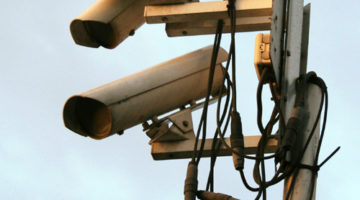
Photo via Public Domain
Jeff Bezos, founder, chairman and CEO of Amazon.com, Inc., meeting with former Secretary of Defense Ash Carter in 2016.
As Jeff Bezos was once quoted, “What consumerism really is, at its worst is getting people to buy things that don’t actually improve their lives.”
This quote might seem paradoxical. It might be because it came from brainyquote.com or it might be because Jeff Bezos is the king of selling you stuff you don’t need. That’s why he has more money than you and I do.
But what if we didn’t let him sell us stuff we don’t need? It seems simple right? Don’t buy something if you don’t need it. Obviously, it’s not that simple. I have an Amazon Echo that doesn’t do anything except tell me the weather and play the Hamilton soundtrack, I have six pairs of Apple headphones hidden throughout my apartment and I have hundreds of books that I haven’t read.
Yesterday I deleted my Amazon Prime account. More accurately, I decided not to renew my membership in July. Baby steps.
Here’s why.
Over the last few years I’ve bought a lot of books. Based on the quantity of books I’ve bought one could assume I read them at the pace of the “I read a book per day and here’s the Lamborghinis in my garage” guy in those YouTube ads. But actually, I read about a book a month.
Why do I buy so many books if I read so few?
For one, used books on Amazon are cheap. Whenever I see something even a little interesting that I might consider reading I click my mouse (which I bought on Amazon for $6) two times, and the book is on the way.
The second reason I buy so many books is more primal.
I’m currently listening to a book on Audible (an audiobook app owned by Amazon) called “The Four: The Hidden DNA of Amazon, Apple, Facebook, and Google by Scott Galloway.” The book is about what makes these four internet companies so successful and potentially dangerous.
Galloway says that Amazon feeds our basic human habit of collecting things. The more things we collect the more prepared we’ll be for a drought or ice age or woolly mammoth attack and the more attractive we will seem to a potential mate.
If this is true it means I’m collecting books to store in my apartment either to prepare for the possibility I won’t be able to buy books anymore some time in the future or so I can get laid by a lady who thinks books are hot. Probably both.
The first part — cheap books — attracts my thinking organ, the brain. I should collect things because one day I might run out. It’s better to have more than enough than to have less.
The second part — chicks dig books — targets an organ lower down.
I’ve spent years collecting, using my brain and thousands of years of evolutionary instinct. I’ve trusted my instincts, gliding through the cunning wilderness of e-commerce and pouncing on any deal that caught my predatory eye. My kill would arrive neatly packaged within two days thanks to my two-day shipping benefits with Prime. I’d place my prize on the shelf and await any suitors.
“Want to see my books?” I would beckon near the community campfire.
“Book emoji plus cucumber emoji equals love and home emoji,” I would write in hieroglyphics on the cave walls.
Well, it worked. I have a girlfriend who was definitely attracted to my vast library of used books I haven’t read.
Amazon succeeded. They let me find the best deals for the sexiest books and now I’m in a happy relationship. And now, I can delete my Amazon Prime account.
Maybe you have a habit of collecting things too. What do you buy most often on Amazon? Stick it to Bezos and stop buying it when you know you have enough.
Opinions expressed in The Nevada Sagebrush are solely those of the author and do not necessarily express the views of The Sagebrush or of its staff. Ryan Suppe studies journalism and philosophy. He can be reached at rsuppe@sagebrush.unr.edu and on Twitter @salsuppe.












